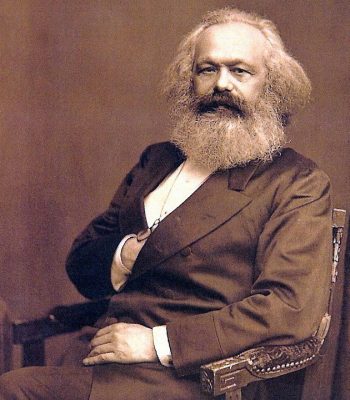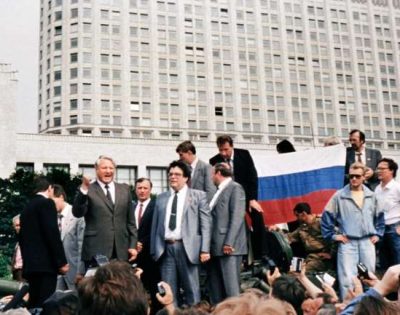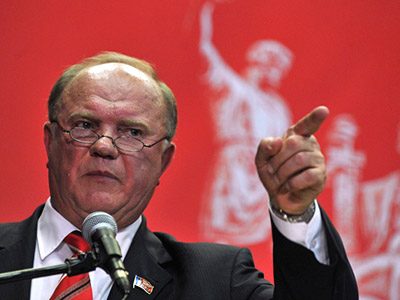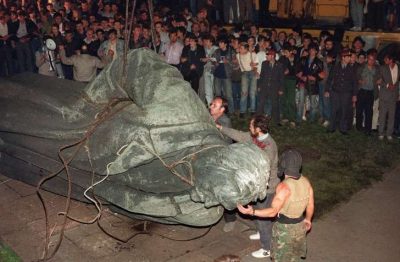![Provided by AFP: This week, while barring a rally organised by [anti-Soviet] Mikhail Shneider, Moscow authorities sanctioned a Communist demonstration and former Soviet officials were shown on state TV voicing nostalgia for the repressive regime This week, while barring Shneider's rally, city authorities sanctioned a Communist demonstration and former Soviet officials were shown on state TV voicing nostalgia for the repressive regime.](http://voiceofdetroit.net/wp-content/uploads/Communist-rally-Russia-2016-640x443.jpg)
Provided by AFP: This week, while barring a rally organised by [anti-Soviet] Mikhail Shneider, Moscow authorities sanctioned a Communist demonstration and former Soviet officials were shown on state TV voicing nostalgia for the former regime .
 By Maria Antonova
By Maria Antonova
August 20, 2016
(VOD has made some clarifying word changes in this article, indicated within […] marks. Some photos and video added by VOD.)

Karl Marx
With Russia marking the 25th anniversary of the abortive coup against then Soviet president Mikhail Gorbachev August 22, 1991, Communists waving Marxist pamphlets and Twitter storms praising the Soviet Union are probably not what the thousands of Russians who rallied in 1991 against a coup by [pro-Soviet] hardliners expected to see 25 years later.
And yet as Russia marks the symbolic anniversary of the August 1991 putsch this week, pro-Kremlin media have concentrated on nostalgia for the Soviet regime, while the authorities have barred a rally by those who manned the barricades.
On August 19, 1991, a group of security chiefs and Communist bosses who opposed Mikhail Gorbachev’s decentralising reforms declared themselves in charge, ushering in three days of turbulence.
Calling themselves the State Committee for the State of the Emergency, they said Gorbachev had stepped aside for “health reasons” and sent tanks rolling into the centre of Moscow.
But crowds flocked to the White House parliament building to defend Boris Yeltsin, the president of the Russian republic of the USSR, who was then seen as a symbol of reform and democracy.
For the last 24 years the people who were on the barricades have held a day of remembrance for the abortive coup that was a starting point for the new Russia.

Provided by AFP: On August 19, 1991, a group of security chiefs and Communist bosses who opposed Gorbachev declared themselves in charge, with Russian President Boris Yeltsin (L) gathering his supporters after denouncing the coup.
This year, Moscow city hall has for the first time refused permission to hold a rally outside the White House, citing complaints about noise from local residents.
“For 25 years we have been doing exactly the same thing every year,” said Mikhail Shneider, the event’s organiser. “There’s never been a time when they completely denied us.”
During the putsch, Shneider was one of the activists calling Muscovites to the barricades around the parliament building, distributing flyers and convincing metro drivers to make an announcement to passengers.
“Our rallies were numerous at first,” Shneider said, but after Vladimir Putin came to power as prime minister in 1999, they started to decrease.

Russian President Vladimir Putin
Putin famously called the breakup of the Soviet Union a great catastrophe.
[“First and foremost it is worth acknowledging that the demise of the Soviet Union was the greatest geopolitical catastrophe of the century,” Putin said during his state of the union speech in 2005. “As for the Russian people, it became a genuine tragedy. Tens of millions of our fellow citizens and countrymen found themselves beyond the fringes of Russian territory.” See http://www.nbcnews.com/id/7632057/ns/world_news/t/putin-soviet-collapse-genuine-tragedy/#.V7hycs9THIU]
Short-lived euphoria
Yeltsin’s former vice-president Alexander Rutskoi who supported him on the barricades though they later fell out now claimed the putschists had the right idea in 1991.
“The only mistake by the State Committee for the State of the Emergency was to send troops to Moscow,” he said at a news conference organised by state-owned domestic news agency Rossiya Segodnya on Thursday.

Russian Communist Party leader Gennady Zyuganov. (AFP photo/Andrey Smirnov)
Meanwhile at state-owned TASS news agency, Communist party chief Gennady Zyuganov gloomily said he wished the coup had succeeded and put the country back on track toward Communism.
Even online, a hashtag #OsuzhdayuRazvalSSSR (I condemn the breakup of the USSR) was shared widely earlier this week, though it was not clear how many of those posting were paid [by the Kremlin].
A survey by Levada independent pollster published this week showed that fewer Russians condemn the putschists, while the number of those supporting their actions was slightly up.

The dismantling of the statue of Soviet secret police founder Felix Dzerzhinsky in 1991.
[The euphoria after the break-up of the USSR] was short-lived and today, as Russia plunges deeper into a protracted recession, “the Soviet past beckons with its certainty and predictability,” wrote Vedomosti daily columnist Andrei Sinitsyn.
Soviet secret police founder Felix Dzerzhinsky’s statue is still gone from its former spot outside the security service headquarters and now stands in a park, but in a sign of the times, this summer restorers erased the protest graffiti on its pedestal that demonstrators painted in 1991.
#OsuzhdayuRazvalSSSR




